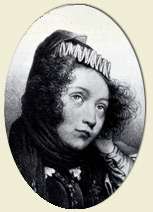Marie Dorval

Marie Dorval (6 January 1798, Lorient, Morbihan – 20 May 1849) was a French actress.
Early life
Born Marie Thomase Amélie Delauney; abandoned by her father when she was five years old, and losing her mother to tuberculosis while still a teenager, at age of 15 she married Alain Dorval, a much older actor, who died five years later. The couple had two children.
Stage career
Marie began acting on stage in earnest following her husband's death. She did not see great success until the age of 29, when she starred in the French play Trente ans, ou la vie d'un joueur ("Thirty years, or the life of a player."). At the age of 31, Marie married journalist Jean-Toussaint Merle.[1]
In January, 1833, female writer George Sand met Marie Dorval after the former wrote the actress a letter of appreciation following one of her performances. The two women became involved in an intimate friendship, and were rumored to have become lesbian lovers. This has since been debated, and has never been verified.[1] Theater critic Gustave Planche reportedly warned Sand to stay away from Dorval. Likewise, Count Alfred de Vigny, Dorval's lover, warned the actress to stay away from Sand, whom he referred to as "that damned lesbian".[1] Popular writers from that time, such as Théophile Gautier and Honoré de Balzac, capitalized on the rumors.
Whatever the truth in their relationship, Sand and Dorval would remain close friends for the remainder of Dorval's lifetime. In 1834, Dorval starred in Vigny's play Chatterton, and in 1840 she played the lead in a play written by Sand, entitled Cosima, and the two women collaborated on the script. However, the play was not well received, and was cancelled after only seven showings.
She had many successes that did follow, especially in popular productions at the Odéon Theatre. Her last two major appearances were in François Ponsard's Lucrèce (1843) and in Adolphe d'Ennery's Marie-Jeanne, ou la femme du peuple (Marie-Jeanne, Or the Woman of the People, 1845).
Her career began going downhill with a shift in fashion and the public's desire for younger actresses, and she began traveling with a troupe of actors doing small shows around the countryside. By the age of 51, her health was failing due to her long life of travel and shows, and she sank into depression following the death of one of her grandchildren. Sand assumed the financial support for Dorval's surviving grandchildren following Marie's death in 1849.[1]
References
- Who's Who in Gay and Lesbian History edited by Robert Aldrich and Garry Wotherspoon; Routhledge, London (2002)